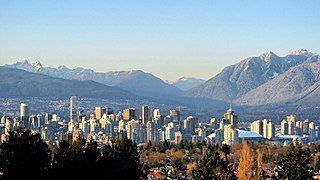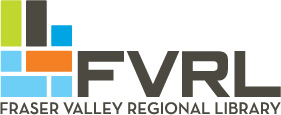
The Lower Mainland is a geographic and cultural region of the mainland coast of British Columbia that generally comprises the regional districts of Metro Vancouver and the Fraser Valley. Home to approximately 3.05 million people as of the 2021 Canadian census, the Lower Mainland contains sixteen of the province's 30 most populous municipalities and approximately 60% of the province's total population.

The Fraser Valley is a geographical region in southwestern British Columbia, Canada and northwestern Washington State. It starts just west of Hope in a narrow valley encompassing the Fraser River and ends at the Pacific Ocean stretching from the North Shore Mountains, opposite the city of Vancouver BC, to just south of Bellingham, Washington.

Abbotsford is a city in British Columbia next to the Canada–United States border, Greater Vancouver and the Fraser River. With a census population of 153,569 people (2021), it is the largest municipality in the province outside metropolitan Vancouver. Abbotsford–Mission has the third-highest proportion of visible minorities among census metropolitan areas in Canada, after the Greater Toronto Area and the Greater Vancouver CMA. It is home to Tradex, the University of the Fraser Valley, and Abbotsford International Airport.

Chilliwack is a city of about 100,000 people and 261 km2 (100 sq mi) in the Canadian province of British Columbia. It is located about 100 km (62 mi) east of the City of Vancouver in the Fraser Valley. The enumerated population is 93,203 in the city and 113,767 in the greater metropolitan area.
Highway 1 is a provincial highway in British Columbia, Canada, that carries the main route of the Trans-Canada Highway (TCH). The highway is 1,047 kilometres (651 mi) long and connects Vancouver Island, the Greater Vancouver region in the Lower Mainland, and the Interior. It is the westernmost portion of the main TCH to be numbered "Highway 1", which continues through Western Canada and extends to the Manitoba–Ontario boundary. The section of Highway 1 in the Lower Mainland is the second-busiest freeway in Canada, after Ontario Highway 401 in Toronto.

Greater Vancouver, also known as Metro Vancouver, is the metropolitan area with its major urban centre being the city of Vancouver, British Columbia, Canada. The term "Greater Vancouver" describes an area that is roughly coterminous with the region governed by the Metro Vancouver Regional District (MVRD), though it predates the 1966 creation of the regional district. It is often used to include areas beyond the boundaries of the regional district but does not generally include wilderness and agricultural areas that are included within the MVRD.

The University of the Fraser Valley (UFV), formerly known as University College of the Fraser Valley and Fraser Valley College, is a public university with campuses in Abbotsford, Chilliwack, Mission and Hope, British Columbia, Canada. Founded in 1974 as Fraser Valley College, it was a response to the need for expanded vocational training in the communities of the Fraser Valley. In 1991, it became a university college, with degree-granting status. As the University College of the Fraser Valley, it grew rapidly, becoming one of the largest university colleges in Canada.

The Fraser Valley Regional District (FVRD) is a regional district in British Columbia, Canada. Its headquarters are in the city of Chilliwack. The FVRD covers an area of 13,361.74 km2 (5,159 sq mi). It was created in 1995 by an amalgamation of the Fraser-Cheam Regional District and Central Fraser Valley Regional District and the portion of the Dewdney-Alouette Regional District from and including the District of Mission eastwards.
This is page shows results of Canadian federal elections in the Fraser Valley region of British Columbia. As defined for this article, the Fraser Valley includes the southern suburbs of Vancouver. Areas outside the Fraser Valley, namely the Fraser Canyon and regions to its west, are also included within one of the ridings. The largest of these ridings is the Chilliwack-Hope riding. This riding also includes most of the Fraser Valley until it joins the Okanagan-Similkameen and extends westward until outside Abbotsford.

Chilliwack North is a provincial electoral district in the Canadian province of British Columbia. It was defined by the 2021 British Columbia electoral redistribution for use in the 2024 British Columbia general election onwards, with boundaries largely corresponding to a predecessor district called Chilliwack in use until 2024.

Barry Penner, is a Canadian lawyer and former politician in the province of British Columbia. He served as a Member of the Legislative Assembly of British Columbia (MLA), representing the riding of Chilliwack from 1996 to 2001, Chilliwack-Kent from 2001 to 2009, and Chilliwack-Hope from 2009 to 2012. A caucus member of the British Columbia Liberal Party, he served in several cabinet posts under premiers Gordon Campbell and Christy Clark, including as Minister of Environment, Minister of Aboriginal Relations and Reconciliation, and Attorney General.

The District of Kent is a district municipality located 116 kilometres (72 mi) east of Vancouver, British Columbia. Part of the Fraser Valley Regional District, Kent consists of several communities, the largest and most well-known being Agassiz—the only town in the municipality—Harrison Mills, Kilby, Mount Woodside, Kent Prairie, Sea Bird Island and Ruby Creek. Included within the municipality's boundaries are several separately-governed Indian reserves, including the Seabird Island First Nation's reserves on and around the island of the same name.
The Fraser Health Authority (FHA) is one of five regional public health authorities in British Columbia. It is governed by the provincial Health Authorities Act.

Envision Financial, a division of First West Credit Union, is based in British Columbia, Canada. Founded in 1946, Envision Financial was established in 2001 through a merger between Lower Mainland-based Delta Credit Union, whose roots were in the fishing industry, and Fraser Valley-based First Heritage Savings Credit Union, which had historic ties to the farming and agriculture industries. First Heritage Savings Credit Union was the product of a merger between East Chilliwack Credit Union and Clearbrook District Mennonite Savings Credit Union in 1983. It is insured by the Credit Union Deposit Insurance Corporation of British Columbia.
Mount Lehman or Mt. Lehman is a small rural community located in the Fraser Valley of south western British Columbia, Canada. The community was established in 1874 and became part of the District of Matsqui in 1892. The District of Matsqui was incorporated into the present day City of Abbotsford, British Columbia in 1995.
Central Fraser Valley Transit System is a public transit system which provides bus services in the Central Fraser Valley area of British Columbia, Canada. Funding for the system is provided by the City of Abbotsford, the District of Mission, the University of the Fraser Valley and BC Transit, the agency responsible for planning and management of municipal transit systems throughout the province. Other than planning and managing bus routes, The Central Fraser Valley Transit System contracts out most of its bus services to FirstCanada ULC.
GHGProof is an open-source model designed to evaluate the impacts of land-use decisions on greenhouse gas emissions and energy consumption at the community scale. It has been developed by Sustainability Solutions Group, a Canadian workers co-operative, and has been widely used in British Columbia since 2008, with regular revisions and updates from SSG's GHGProof pages. Reviews of GHGProof and comparison to other modelling platforms may be found in references.
Chilliwack is a city made up of several amalgamated villages and communities. The urban core has a decidedly north–south axis bisected by the Trans-Canada Highway. The city is bounded in north by the Fraser River, in the east by the Eastern Hillsides, in the south by the Canada-U.S. border, and in the west by the Vedder Canal.

Abbotsford Regional Hospital and Cancer Centre (ARHCC) is a 300-bed Canadian health care facility in the City of Abbotsford, British Columbia that houses the acute care Abbotsford Regional Hospital (ARH) operated by Fraser Health and the regional cancer facility operated by the BC Cancer Agency.











